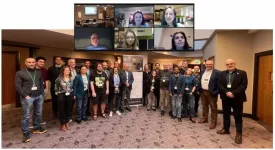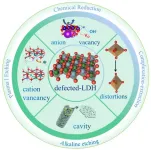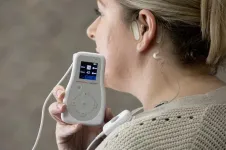(Press-News.org) 29 February 2024: Lockdowns imposed during the COVID-19 pandemic had an impact on the gut microbiome development of babies born during these periods according to new research from RCSI University of Medicine and Health Sciences, Children’s Health Ireland and APC Microbiome Ireland (APC), a world leading SFI Research Centre, based in University College Cork.
Our gut microbiome, an ecosystem of microbes that live in our digestive tract, plays an essential role in human health. The study published in Allergy is the first to specifically explore the gut health of newborns in the pandemic. It revealed significant differences in the microbiome development of babies born during lockdown periods when compared to pre-pandemic babies. Babies born during lockdown also had lower than expected rates of allergic conditions, such as food allergies.
The findings highlighted gut health benefits for ‘pandemic babies’ arising from the unique environment of lockdown including lower rates of infection and consequent antibiotic use, and increased duration of breastfeeding. The newborns were found to have more of the beneficial microbes acquired after birth from their mothers. These maternal microbes could be playing a protective role against allergic diseases.
Professor Jonathan Hourihane, Head of the Department of Paediatrics at RCSI, Consultant Paediatrician at Children’s Health Ireland Temple Street, who is joint senior author of the study, commented on the research’s implications: “This study offers a new perspective on the impact of social isolation in early life on the gut microbiome. Notably, the lower allergy rates among newborns during the lockdown could highlight the impact of lifestyle and environmental factors, such as frequent antibiotic use, on the rise of allergic diseases.
“We hope to re-examine these children when they are 5 years old to see if there are longer term impacts of these interesting changes in early gut microbiome.”
Professor Liam O’Mahony, Principal Investigator at APC Microbiome Ireland and Professor of Immunology, at University College Cork is joint senior author. He added: “While we all start life sterile, communities of beneficial microbes that inhabit our gut develop over the first years of life. We took the opportunity to study microbiome development in infants raised during the early COVID-19 era when strict social distancing restrictions were in place, as the complexity of early life exposures was reduced and this facilitated a more accurate identification of the key early life exposures. Prior to this study it has been difficult to fully determine the relative contribution of these multiple environmental exposures and dietary factors on early life microbiome development.
“One fascinating outcome is that due to reduced human exposures and protection from infection, only 17% of infants required an antibiotic by one year of age, which correlated with higher levels of beneficial bacteria such as bifidobacteria. The study has provided a rich repository of data, which we will continue to analyse and investigate in the future.”
The researchers from RCSI, CHI and APC Microbiome Ireland analysed fecal samples from 351 babies born in the first three months of the pandemic, comparing these with pre-pandemic cohorts. The former were part of the CORAL (Impact of CoronaVirus Pandemic on Allergic and Autoimmune Dysregulation in Infants Born During Lockdown) project. Online questionnaires were used to collect information on diet, home environment and health. Stool samples were collected at 6,12 and 24 months and allergy testing was performed at 12 and 24 months.
'Association between Gut Microbiota Development and Allergy in Infants Born during Pandemic-Related Social Distancing Restrictions’ was carried out in collaboration with University College Cork, University of Helsinki, University of Colorado, Karolinska Institute Stockholm, Children’s Health Ireland, Rotunda Hospital and The Coombe Hospital.
The CORAL study was supported by the Temple Street Hospital Foundation in Dublin, Ireland and the Clemens von Pirquet Foundation in Geneva, Switzerland.
ENDS
For further information:
Laura Anderson, Communications Officer, RCSI
+353 87 199 0399/ lauraanderson@rcsi.ie
Notes to editors
Professor Jonathan Hourihane is available for interview; contact via lauraanderson@rcsi.ie/ 087 199 0399)
Prof Liam O’Mahony is available for interview; contact via APC Media Contact: Tina Darb tdarb@ucc.ie / +353 87 7826500
About RCSI University of Medicine and Health Sciences
RCSI University of Medicine and Health Sciences is ranked first in the world for its contribution to UN Sustainable Development Goal 3, Good Health and Well-being, in the Times Higher Education (THE) University Impact Rankings 2023.
Exclusively focused on education and research to drive improvements in human health worldwide, RCSI is an international not-for-profit university, headquartered in Dublin. It is among the top 300 universities worldwide in the World University Rankings (2024). RCSI has been awarded Athena Swan Bronze accreditation for positive gender practice in higher education.
Founded in 1784 as the Royal College of Surgeons in Ireland (RCSI) with national responsibility for training surgeons in Ireland, today RCSI is an innovative, world-leading international health sciences university and research institution offering education and training at undergraduate, postgraduate and professional level.
Visit the RCSI MyHealth Expert Directory to find the details of our experts across a range of healthcare issues and concerns. Recognising their responsibility to share their knowledge and discoveries to empower people with information that leads them to better health, these clinicians and researchers are willing to engage with the media in their area of expertise.
About APC Microbiome Ireland
APC Microbiome Ireland is a world leading SFI Research Centre based in University College Cork and Teagasc. It was formed in 2003 with funding from Science Foundation Ireland and in conjunction with key industry partners. APC represents a seamless collaboration between University College Cork and Teagasc (the Irish Agriculture and Food Development Authority).
It is widely recognised that the gut microbiota plays an important role in human health and has become one of the most dynamic, complex, and exciting areas of research in both food and pharmaceutical arenas. Over the last decade APC has established itself as one of the leading global centres in gut microbiota research.
APC has made several landmark discoveries and has published over 3,000 research articles in peer-reviewed journals, generating many journal covers and associated editorials. Recent research areas being led by APC include the development of new diagnostics or biomarkers of health or risk of disease (e.g. colon cancer) based on analysis of the microbiota; exploring the mechanisms by which the microbiota may be favourably mobilised or manipulated (e.g. by bacteriophage) to promote health and ‘mining’ the microbiota for new drugs (e.g. smart antibiotics) and functional food ingredients.
END
New research reveals that lockdowns had an impact on gut microbes and allergies in newborns
2024-02-29
ELSE PRESS RELEASES FROM THIS DATE:
Seeing the wood for the trees: how archaeologists use hazelnuts to reconstruct ancient woodlands
2024-02-29
If we could stand in a landscape that our Mesolithic ancestors called home, what would we see around us? Scientists have devised a method of analyzing preserved hazelnut shells to tell us whether the microhabitats around archaeological sites were heavily forested or open and pasture-like. This could help us understand not only what a local environment looked like thousands of years ago, but how humans have impacted their habitats over time.
“By analyzing the carbon in hazelnuts recovered from archaeological sites in southern Sweden, from Mesolithic hunter-gatherer ...
EU-funded Biodiversity Community Integrated Knowledge Library (BiCIKL) project sums up outcomes and future prospects at a Final GA in Cambridge
2024-02-29
The city of Cambridge and the Wellcome Campus hosted the Final General Assembly of the EU-funded project BiCIKL (acronym for Biodiversity Community Integrated Knowledge Library): a 36-month endeavour that saw 14 member institutions and 15 research infrastructures representing diverse actors from the biodiversity data realm come together to improve bi-directional links between different platforms, standards, formats and scientific fields. Consortium members who could not attend the meeting in Cambridge joined the meeting remotely.
The ...
Detailed study demonstrates how pulse oximeters significantly overestimate oxygen readings in people with darker skin tones
2024-02-29
Pulse oximeters – one of the most common medical devices used in global healthcare – can provide significantly overestimated oxygen saturation readings in people with darker skin tones, according to the most comprehensive study ever to explore the issue.
Published in the British Journal of Anaesthesia, the new study is based on a systematic review of previous research into the use of the devices, and examined 44 studies dating from the mid-1970s to the present day.
In the course of that, researchers assessed more than 733,000 oxygen saturation readings taken from over 222,000 people – including almost ...
Virtual walking by synthesizing avatars into a 360-degree video
2024-02-29
Overview:
Researchers at the Toyohashi University of Technology and the University of Tokyo developed a system that provides a virtual walking experience to a seated person by real-time synthesis of a walking avatar and its shadow on a 360-degree video with vibrations to the feet. The shadow of the avatar induces an illusory presence of their body. In the future, it is expected to provide an immersive experience for any recorded medium with a virtual embodiment.
Details:
Walking is a fundamental activity for humans ...
How to make difficult-to-cut materials and components “easy-to-cut”?
2024-02-29
Difficult-to-cut materials such as titanium alloys, high-temperature alloys, metal/ceramic/polymer-matrix composites, hard and brittle materials, as well as geometrically complex components such as thin-walled structures, micro channels and complex surfaces, are widely used in aerospace community. Nevertheless, many problems including severe and rapid tool wear, low machining efficiency, and poor surface integrity exist in mechanical machining. How to efficiently and precisely process these materials and components, i.e., make difficult-to-cut ...
Defects engineering of layered double hydroxide-based electrocatalyst for water splitting
2024-02-29
In the context of the gradual depletion of fossil fuels and the energy crisis, hydrogen energy has attracted widespread attention due to its ultra-high energy density and eco-friendly properties. However, most of the hydrogen production still relies on fossil fuels, with less than 1 million tonnes produced as low-emission hydrogen in 2021, which means it has limited benefits in mitigating the energy crisis and environmental degradation. Alternatively, hydrogen production via water electrolysis has the advantages ...
International symposium to converge food-energy-water research for net zero development scheduled for March
2024-02-29
Researchers with the University of Tennessee, Knoxville, and Oak Ridge National Laboratory are hosting an international symposium focused on efforts to make urban and rural communities healthy and resilient to changes in climate, demographics, natural resources and ecosystems.
The “Food-Energy-Water Bioeconomies for Net-Zero Transition” international conference will be March 18-20 in Knoxville. The interdisciplinary conference is sponsored through a U.S. National Science Foundation grant awarded to a team led by Jie ...
Walking, reminiscing benefit brain health in older Black adults
2024-02-29
An innovative Oregon Health & Science University research program that enlists older Black adults to walk through and reminisce about historically Black neighborhoods in Portland — which now look very different after rapid change through gentrification — may help improve cognitive function, a new study finds.
The OHSU project has gained wide interest since its 2016 launch, with similar versions beginning to take root in Seattle and Oakland, California.
Now, newly published research suggests it may improve brain health in a population that’s disproportionately affected by Alzheimer’s disease. The study, published online ...
Uncovering the connections between autism, sensory hypersensitivity
2024-02-29
Supported by a $2 million R01 grant from the National Institutes of Health, the Auerbach Lab at the Beckman Institute for Advanced Science and Technology will examine how different genes associated with autism spectrum disorders may similarly impact our brain’s neurons, resulting in heightened sensitivity to sounds.
Autism spectrum disorders are genetically complex, and hundreds of genes are implicated in their development. As a result, some may conclude that autism is a collection of disconnected disorders with comparable symptoms. However, much like how roads converge as they approach a destination, at some level of brain function ...
Medical University of South Carolina neuroscientist honored for trailblazing pain management research
2024-02-29
Medical University of South Carolina neuroscientist Bashar Badran, Ph.D., was one of only 10 investigators nationwide recognized for their research at the fifth annual scientific meeting of the National Institutes of Health – Helping to End Addiction Long-Term (NIH HEAL) Initiative in Bethesda, Maryland. Badran received an honorable mention for the NIH HEAL Initiative Trailblazer Award.
The NIH HEAL Initiative provides funding to encourage scientific research into opioid use and pain management to fast-track progress in the face of the country’s current opioid epidemic. Its Trailblazer ...





